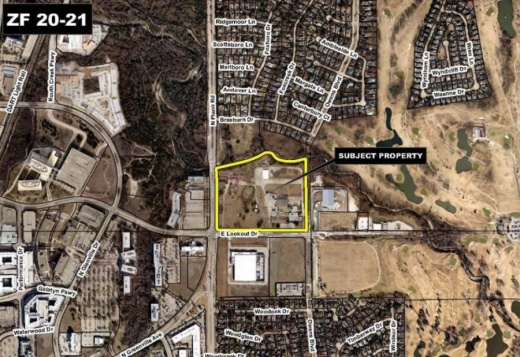The 27-acre parcel at the northeast corner of Plano Road and Lookout Drive, known as Owens Spring Creek Farm, is owned by Standridge Companies, a commercial real estate firm based in Addison. Founder and President Stacy Standridge had hoped to sell the property to Crow Holdings Industrial, which planned to build three spec warehouses totaling about 354,000 square feet.
After nearly five hours of deliberation and public comment, Richardson City Council voted Jan. 25 to reject Crow’s rezoning request, which sought to add 44-foot, one-story buildings, a height normally reserved for two-story buildings. Under the allowed zoning, one-story buildings are limited to 29 feet in height, Richardson Development Director Michael Spicer said.
Neighbors came out in droves to voice their opposition to Crow’s proposal. Among their concerns were increased traffic; noise caused by idling trucks; and flood risk associated with the proposed amount of impervious cover on the site.
Nearby resident Charline King said the development would “forever change” her neighborhood’s quality of life.
“No amount of concessions will nullify that this is 22 acres of a concrete warehouse distribution center in a greenbelt next to residences and a golf course,” she said during the Jan. 25 public hearing.
The Owens property has been zoned industrial since the 1960s. Part of the property was home to the Owens Country Sausage plant until its demolition in 2013. Much of the area is residential.
This is not the first time a proposed development on the land has been opposed by residents. Last fall, Standridge proposed a mixed-use project that would have included retail and residential properties.
When an overwhelming number of residents came out against the project, Standridge chose to forgo the development, he said.
Neighbor Gerald Long said he and fellow residents were opposed to the mixed-use project in part because they feared homeowners there would quickly become disillusioned by odor and noise from an existing garbage transfer station located nearby.
“Those new homeowners, after a year or two, would have sold their homes at lower-than-market prices just to get out of them, thereby affecting the other homes in the surrounding neighborhoods,” Long said. “We were afraid it would turn into a dense neighborhood of low-cost rentals.”
Long said he remains opposed to a large warehouse project but would be satisfied with a single-family development that fits with the area.
“I think Standridge is wanting industrial land prices that a residential builder would not consider,” he said.
Mayor Pro Tem Janet DePuy warned that if Crow’s request were to be denied, the developer would likely return with a new industrial use that does not require a zoning change, leaving the city without “any negotiating power.”
Standridge said his staff has been “inundated” with interest from industrial developers who will meet the minimum standards of the existing zoning.
“We are likely to go in that direction since it will not require another public hearing,” he said.





